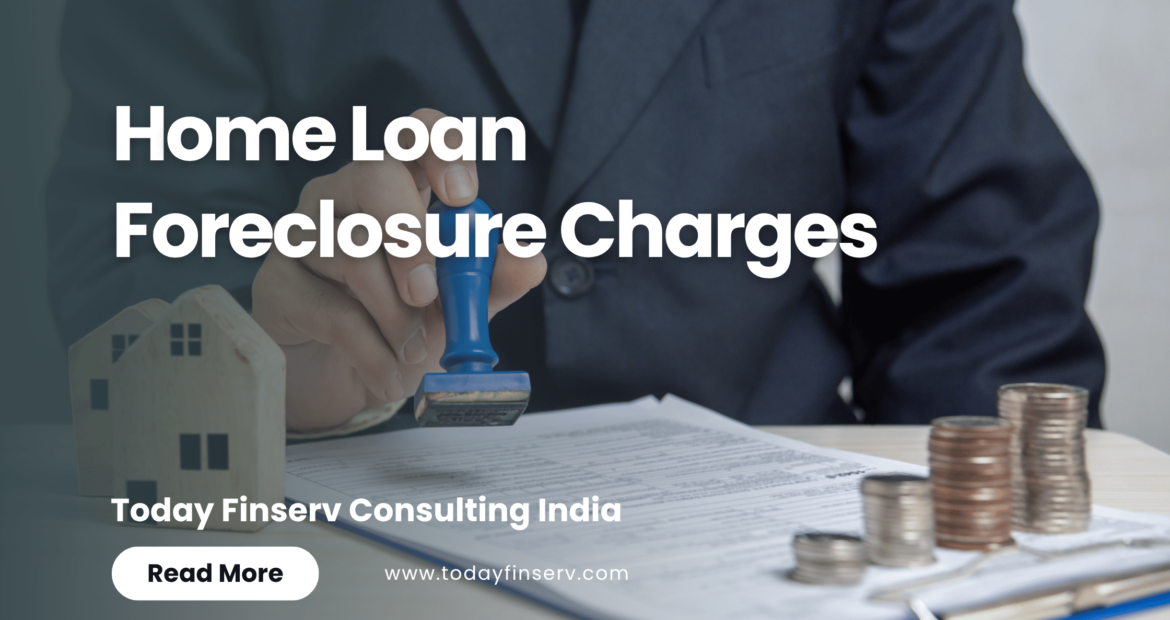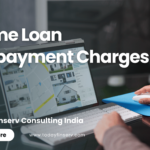A lot of people dream of owning a house, and home loans make this accessible dreams achievable with their flexible repayment options. But as you know, life is unpredictable. You may be in a circumstance where paying off your home loan’s full remaining balance is plausible before the loan’s set period expires. This is referred to as loan foreclosure. While this makes it possible to save a great deal of money on interest payments, it can also incur a cost: home loan foreclosure charges.
At Today Finserv Consulting India, we walk our clients through every stage of a home loan and help them understand what foreclosure entails. In this blog, we will explain what foreclosure is, the various charges associated with it, when they’re applicable, and how one can reduce or completely avoid those charges.
What is Home Loan Foreclosure?
Foreclosure is defined as paying off the entire remaining balance of a loan before the period agreed in the contract. Unlike partial prepayment where the borrower is allowed to pay back a certain part of the loan amount ahead of the schedule, through foreclosure the loan is paid back in full.
There are a plethora of reasons why a borrower may decide to pay off their mortgage such as:
- Receiving additional funds (inheritance, loan bonuses, sale of property)
- Capitalizing on better investment returns
- Reducing long-term interest payments
- Retirement or other goal oriented plans
Although paying off a loan offers financial independence and peace of mind, a borrower may face financial penalties from lenders on their foreclosure, depending on the loan type and borrower classification.
Home Loan Cancellation and Prepayment: Is there a Difference?
- Aspect Prepayment Foreclosure
- Type Partial repayment Full repayment
- Purpose Lowering principal amounts saves interest Closing prior to the set duration
Charges less, depend on lender type charge more (more likely with fixed loans) - Impact Reduces EMI or tenure Completes obligation to the loan
What Triggers Foreclosure Charges?
Charges pertaining to foreclosure are triggered under the following conditions:
Type of Interest Rate
Floating Rate Loans: According to RBI’s defined benchmarks, banks are not allowed to impose foreclosure costs on floating rate mortgages secured by individual borrowers.
Fixed Rate Loans: These are more likely to incur charges, especially when repayment comes through an advance (sourced from second bank or financial institution).
Borrower Type
Individual Borrowers: Largely benefit from the waivers or certain protections under RBI policy.
Non-Individual Borrowers: Partnerships, corporations, and trusts may incur foreclosure charges irrespective of the type of interest charged.
Loan Source
Own Funds: Many lenders tend to be lenient when there is no additional fee for using personal savings or monthly savings account to pay off the loan.
Balance Transfer: Most lenders will charge additional fees if the purpose of closing the loan is to move it to another financial institution.
RBI Guidelines regarding Home Loan Foreclosure
The RBI and NHB have developed policies to satisfy the needs of every borrower and issue credit, and these policies include:
No foreclosure charges shall apply to individual floating home loans whether the funds used are internal or external through a balance transfer from another bank.
In case of fixed rate home loans, a lender will charge a foreclosure fee unless otherwise stated in the agreement.
Ways borrower can benefit from foreclosure.
Provided the charges will apply, foreclosure can still offer great value to a borrower.
Save on Interest Costs
A mortgage loan of ₹40 lakhs taken at 8.5 % for a period of 20 years will incur a total interest repayment obligation of ₹44+ Lakhs. Surrendering this loan after 5–10 years will render a significant portion of this obligatoin useless.
Improved Credit Score
Paying off a loan ahead of time means one has good credit. A person with a non-revolving credit will also benefit because one is paying down their debt before the deadline.
Mental Peace
Being over-indebted can limit growth and creating flexibility in the planning calendar, for lifetime goals both short and long-term.
Better Liquidity
Shifts spending out of the ordinary into something much more beneficial like a life expense identifying the need for emergency planning or investment which MAY occur in the future.
How to Avoid or Minimize Foreclosure Charges?
Here, at Today Finserv Consulting India, we try to help our clients minimize costs through smart planning:
Choose A Floating Rate Loan
This option is the simplest way to avoid foreclosure charges. Loans on Floating rate are exempt under RBI regulations for individual borrowers.
Use Your Own Funds
If possible, pay by funds like savings, bonuses, or other personal resources already at hand. Don’t use another loan for repayment as the money borrowed may lead to additional fees.
Review Agreement of the Loan Terms
With some lenders, there may or may not be a lock-in period or an imposed penalty in the fine print. Our professionals will assist you in negotiating these terms before you sign.
Request for Waivers
Usually, banks will waive off Foreclosure Fees for customers that have stood with the bank for a long time or as premium customers. Using our networks, we are able to negotiate such waivers for our clients.
Plan Your Refinancing Ahead
For those foreclosing for a balance transfer, remember to check the cost savings x total cost of foreclosure fee. Many times, interest savings far outweigh the one-time charge.
Step-by-Step Foreclosure Process
Any applicant intending to foreclose a Home Loan should do the following:
- Notify your lender, either by providing them with a letter or by using the online portal.
- Ask for a foreclosure statement detailing the total outstanding amount.
- Gather the necessary funds for settlement.
- Provide all required documents (ID verification, loan agreement, etc.).
- Make payments for the foreclosure amount through cheque, demand draft, or online transfer.
- Obtain NOC (No Objection Certificate) and closure letter of the loan.
- Check that the lien is canceled from the title of the property at the registrar’s office.
Conclusion
Reducing long term interest improving one credit score and freeing oneself from debt makes foreclosing the home loan one of the smartest financial choices. Nonetheless, prior understanding of the foreclosure charges and regulatory policies is mandatory.




